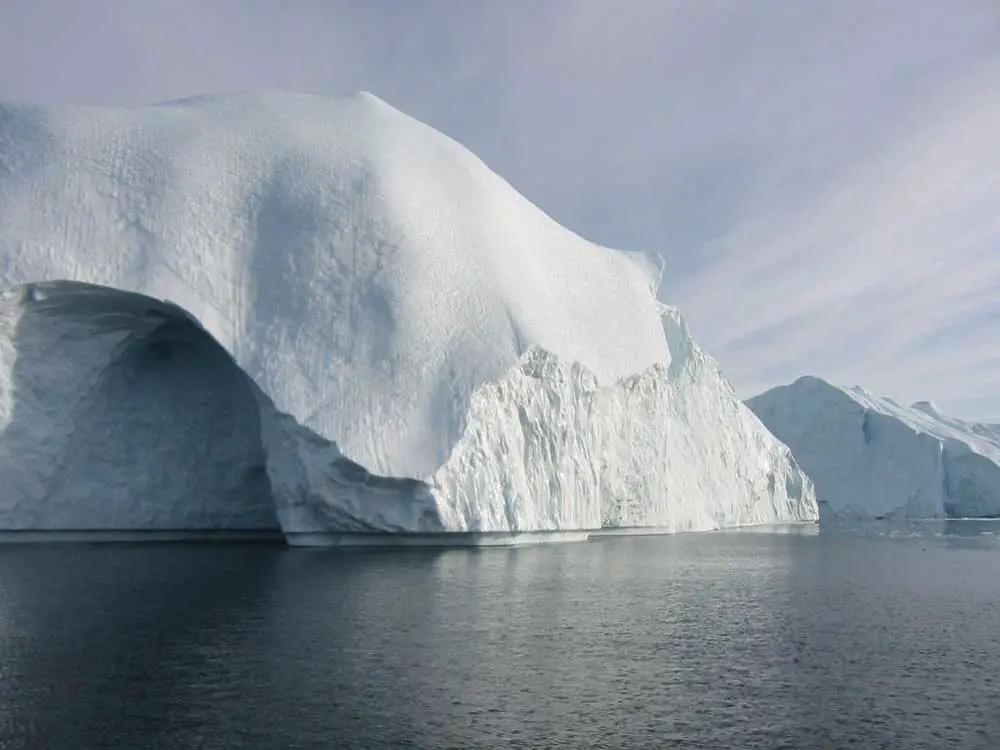
By Manel Poch Espallargas and Gonzalo Delacámara Andrés
As children, many of us played the “telephone” game – a message is whispered from one person to the next, invariably getting distorted as it passes along the line. In this game, people’s perception and understanding matters more than the original message, but as the US Secretary of Defence James Schlesinger said in 1975, “everyone is entitled to his own opinions, but not to his own facts”.
Today, this statement applies to climate change. While there is broad scientific consensus that human action has contributed decisively to warming the atmosphere, ocean and land, causing widespread change in a very short time, public opinion is less clear. At least 97% of scientists agree that humanity contributes to climate change, but the same cannot be said for society at large.
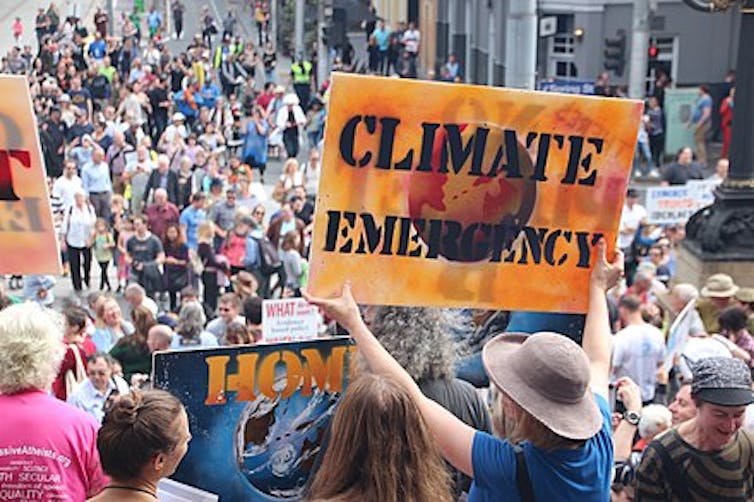
Takver / Wikimedia Commons, CC BY
Same facts, different perceptions
Various studies and surveys show that social consensus on climate change is stronger in Europe than in the United States, where only 12% of citizens are aware of the scientific community’s near-total unanimity. This is a result of, among other things, disinformation, media portrayals, and cognitive bias.
Presenting climate change as a legitimate debate undermines the value of scientific consensus, often validating climate denialism – or its more recent iteration, delayism.
Moreover, there is a tendency to present ideological interpretations of the evidence as mere scientific disagreement: 82% of US Democratic voters believe that human activity contributes significantly to climate change, compared to just 38% of Republicans. This division also extends to responses to the crisis.
No enforcement, no accountability
The international community’s overall response has not been slow. As governments and multilateral bodies have become more aware of the issue they have committed themselves, albeit unevenly, to mitigation and adaptation plans.
This has also happened with decarbonisation plans, though, for the most part, commitments to reduce greenhouse gas emissions, like those laid out in the 2015 Paris Agreement, are not binding.
This illustrates a clear obstacle to change: these commitments include no legal obligations, no effective enforcement mechanisms, and no accountability measures. This undermines any agreements, and their uneven and inconsistent implementation allows some countries to be “free-riders”, reaping the benefits of reduced emissions while contributing little to the costs.
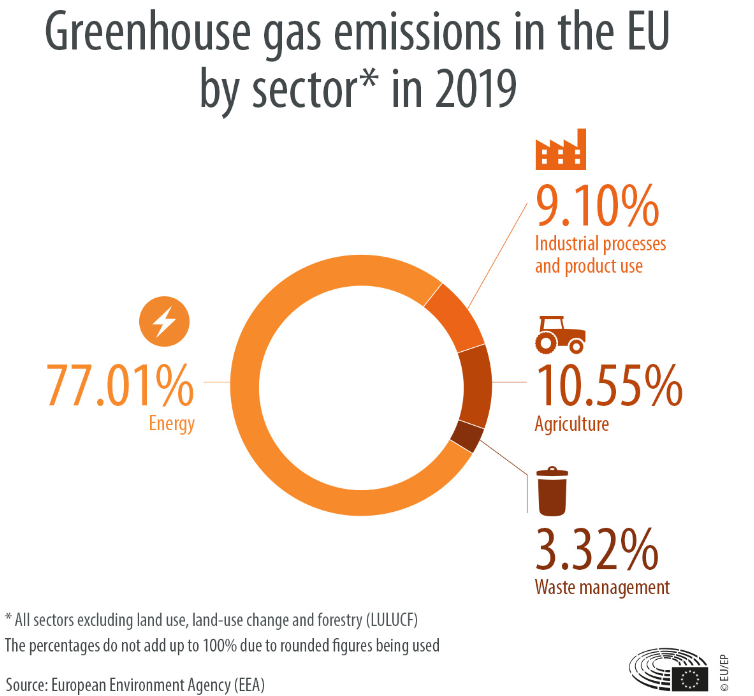
European Environmental Agency
Transition plans in companies and countries, and even in the global energy sector, consist of detailed strategies towards carbon neutrality and the goal of net zero. These cover a range of measures, from technological innovation to regulatory instruments, investments, and changes in individual and collective behaviour. However, confusion surrounding objectives like carbon neutrality and net zero is also a deterrent in many cases.
There has been some progress since the Paris Agreement in 2015, which projected emissions in 2030 under then current policies to increase by 16%. Today, a 3% increase is projected in the same period, but emissions would still have to fall by 28% to stay within 2°C of global warming, and by 42% to stay under 1.5°C.
Carbon dioxide emissions from China’s energy sector, for instance, increased by 5.2% in 2023. This means that an unprecedented 4-6% reduction in 2025 would be needed to meet the target.
Why can’t we slow down emissions?
There is no simple or singular explanation for humanity’s inconsistent attitudes towards climate change. It is an immensely complex issue, and only by recognising its complexity can we understand and try to change behaviours.
Despite slowing annual growth, global demand for fossil fuels has not peaked. It is expected to do so by 2030, but only if electric vehicle uptake increases, and if China’s economy grows slowly and it deepens investments in renewable energy.
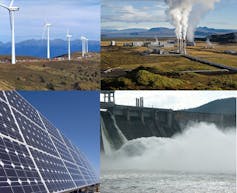
Wikimedia Commons, CC BY
Substantial amounts are still being poured into oil and gas investments. Between 2016 and 2023, they reached an annual average of around $0.75 trillion.
In 2023, global investment in clean energy reached an estimated $1.8 trillion, although concentrated in a few countries: mainly China, the European Union and the USA. For every dollar invested in hydrocarbons, approximately 1.8 dollars are already going into clean energy, but not all of it into renewables.
It should also be noted that long term “rebound effects” can often offset successful reductions in use of certain raw materials such as coal.
Furthermore, the benefits of carbon emission reductions are global and long-term, while the associated costs are often local and immediate.

Planet Labos / Wikimedia Commons, CC BY
Meanwhile, in low-income and emerging countries a lot of development is still less environmentally friendly – such as India’s ongoing dependence on coal – despite evidence that the co-benefits of reducing carbon emissions outweigh the cost of mitigation in a number of sectors.
Solutions remain elusive
It seems clear that there is no single solution. Some possible solutions require infrastructure or technologies to manage resources more efficiently, but more and more involve changes to our lifestyles and values.
In classical economics, the idea of rationality assumes that, with adequate information and income, an individual will always choose that which maximises their wellbeing. However, this explanation falls short – it assumes that people only live to maximise satisfaction through consumption, and ignores dreams, expectations and goals that may include other human beings.
The work of Herbert Simon in the 1950s demonstrates that our decisions are more accurately explained by what is known as bounded rationality: our cognitive capacity, information and time are limited, so we simplify reality and adapt.
For his part, Zygmunt Bauman’s conception of “liquid modernity” envisaged the transition from a solid modernity to a more fluid, unstable form, unable to maintain one set of behaviours for long, and much more prone to change.
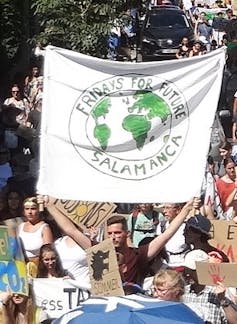
Wikimedia Commons, CC BY
In the same vein, Gilles Lipovetsky speaks about the individualism and hedonism of a culture that prioritises the immediate fulfilment of individual desires, as opposed to commitment and sacrifice in service of ethical principles.
How do we reconcile these ideas that explain the way we respond to imperatives of sacrifice that, implicitly or explicitly, appear in the narratives of climate action and just transition?
Perhaps recognising complexity and trying to understand how we decide is part of the answer. Biases and inconsistencies are easier to detect in others than in oneself.
Manel Poch Espallargas, Catedrático de Ingeniería Química, Universitat de Girona and Gonzalo Delacámara Andrés, Director del IE Centre for Water & Climate Adaptation, IE University
This article is republished from The Conversation under a Creative Commons license. Read the original article.
![]()
Manel Poch Espallargas is Professor of Chemical Engineering at the University of Girona in Spain. Gonzalo Delacámara Andrés is Director of the IE Centre for Water & Climate Adaptation at IE University in Segovia, Spain.






























Samuel L. Bronkowitz says
Because scientists know what they’re talking about because it’s their profession while skeptics get their information while toilet googling
JimboXYZ says
Because at the end of the day, nobody is willing to go without, nobody sees themselves as the problem & certainly nobody wants to leave this Earthly life as the real solution for the noble & thankless good of the rest of the human race or planet Earth. Is that selfish or just a simple law of nature as survival of the fittest ? On one hand, I have several neighbors that drive cars that produce 650+ hp and might get 10 mpg in Palm Coast city driving conditions & that’s if they baby that Ford, GM or Chrysler/Dodge muscle car. On the other hand I drive a car with 100 hp that gets 36+ mpg in Palm Coast city driving conditions. The neighbors use their car for every commute & errand. Me, I ride a bicycle for commutes & errands that don’t involve grocery shopping. And then it’s how many folks live in that house that have a car, don’t conserve, blah, blah, blah. Did I comment to shame my neighbors, that I am somehow better than them ? Well, end of the day again, I go without for my sacrifices, the neighbors obviously aren’t willing to make similar sacrifices. I doubt they are aware of anything anyone else is doing. And even f they were aware, they would neither appreciate nor care. Probably see it as another excuse to bring another life into the world & use anything I conserved.
True story, remember Sandra Fluke back when Obama-Biden was in power. I had the same lifestyle for conservation back then. I cycled thousands of miles each year. And when I was watching the news one day. To my horror, every female had booked a flight to DC to protest for the cause. Wearing their stupid vagina knitted hats, they pissed away every gallon of fuel I conserved. Polluted far beyond anything I could’ve consumed for a more normal life.
It’s all a perspective really. When the Save the Planet types don’t care, put their relative “rights” ahead of anyone else’s ? The Save the Plane types are fruads. That’s what the human race is. It was that way 14 years ago, it is that way today. And even if they abolish fossil fuel cars globally, the EV’s will end up polluting the planet far worse & will be a costlier solution in the process. Elon Musk is a billionaire, flirted with trillionaire status and the Tesla cars that are manufactured are arguably as bad for the environment for mining battery materials as fracking for fossil fuel is. We have a few Tesla people in Flagler County, Klufas being one of them. They want the fossil fuel people to pay for their EV charging stations. There are no free lunches in his universe. Maybe when it all unravels & mankind is on the edge of extinction that realization happens ? I doubt it though, it’ll be a free for all to use the last of it up, hoarding & gouging. That evidence is too obvious from the 2020 Covid pandemic year, the 2021 & beyond where hoarding, gouging & inflation has ruled the day. Sorry to have a dim view of the human race, but live long enough, see the human race for what it really is, the parasites in this universe, myself included. Had a discussion once about conserving, not polluting. the question always comes up, “What if you were the only one making sacrifices ?” Some of it is voluntary, a lot more of it is financial hardship and forced sacrifices. That’s just the human race too for motives ?
https://en.wikipedia.org/wiki/Sandra_Fluke
Pierre Tristam says
Pinch me: did Jimbo really go all this length without once mentioning “Biden-Harris inflation” or Hunter Biden’s motherboard? Are we back in Kansas, Toto?
The dude says
He still managed to build a straw man… er… straw woman and have a good tilt at it… evidently he still has nightmares about those vagina hats or something.
Deborah Coffey says
LOL! I was just about to tell Jimbo that I hate agreeing with him for the first time and to thank him for riding his bike!
JW says
The problem is simple: American lack of education resulting in most people unable to distinguish between truth and lies.
Other countries are moving in the same direction because of the internet and smart phones which are not smart at all!
People are becoming lazier and thus more stupid
Sherry says
@JW. . . When you have so many people who believe the BS FOX talking point about melting ice cubes not making the seal levels higher. . . with NO understanding that melting glaciers are actually in inland mountains, we really do have a huge problem with lack of education in the USA. It’s astounding that over 85% of US citizens don’t even have passports. . . tiny minds create tiny very limited realities!
oldtimer says
Humans are definitely speeding up the problem, but the earth is in a state of constant change. North America was under ice, the deserts used to be under seas. After we are gone (like the dinosaurs) the earth will keep on changing. I’m not being morbid just being real
The dude says
I mean look at the country… around 40% are steadfast in their support of a proven grifter, felon, and con artist.
The same group in the thrall of the would be great orange MAGA king, tend to not be very educated, and to not believe in science.
Sherry Epley says
Thank you dude!